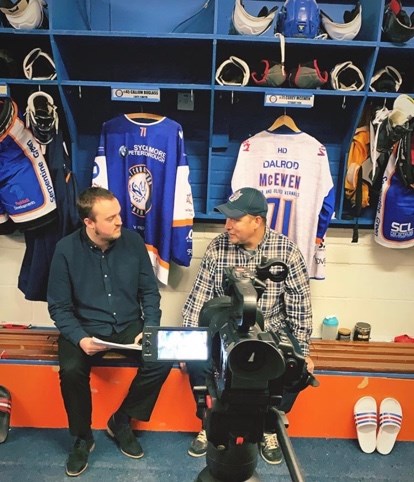There are several skills and qualifications that will help you break into the sports broadcasting industry. By combining these with relevant and varied experience, you’ll be perfectly set to excel in this competitive but hugely rewarding sector.
Whether it’s videography, match day commentary, news writing or any other aspect of sports broadcasting you want to specialise in, there are several steps you can take that won’t guarantee you a job, but will certainly get your foot in the door…
Where do I start?

A comprehensive knowledge of the industry is always vital to stand out from your peers. Whether it’s ensuring your football knowledge extends beyond the Premier League, or your sports knowledge extends beyond football, an active interest in the industry you want to work in – experiencing it first-hand as a fan – provides a fresh perspective and genuine insight into what audiences want from sport.
Familiarising yourself with any necessary equipment and technology is also a good place to start, so that when you embark upon any work experience, or enrol on any courses, you’re able to get stuck right in.
What qualifications do I need?
A Bachelor’s degree, specifically a Sports Broadcasting degree, or an industry-orientated programme in a relevant field such as Sports Business, is the primary qualification needed to secure a role as a professional sports broadcaster.
By specialising in the sports sector from this early stage in your career, you’re not only demonstrating a genuine passion and commitment to the industry; you will also build your knowledge of the specific workings of sport, it’s fast-paced nature and it’s overwhelming popularity which shapes everything behind the scenes.
What courses should I take?

On top of your undergraduate degree, there are also several courses you can take that propel your knowledge of specific areas within sports broadcasting.
If you want to excel academically in football broadcasting, you can study for a Master’s degree in a related field, such as Football Business or Football Communications to augment your knowledge of the industry and prove your determination to go the extra mile.
Gaining experience
Qualifications alone won’t be enough to land a role as a professional sports broadcaster. These need to be supported by tangible evidence that you understand the practicalities of the industry and have combined theory with practice.
Many Sports Broadcasting courses, such as those offered by UCFB, the world’s first football and sports university, offer internship opportunities for students alongside their studies. They provide exclusive access to a range of work placements with Premier League clubs, the FA and several other industry partners.
What happens after I am qualified?

After completing your sports broadcaster degree, and gaining plenty of experience throughout your time at university, you will be ready to apply for your dream job in sport.
If there has been a work placement that you particularly enjoyed or where you felt particularly valuable, it is worth reminding your former employers that you’re now able to work full-time to see if they’re willing to offer you a permanent role. If you’re desperate to try something completely new, it will be useful to utilise the network of contacts you secured throughout your degree anyway.

















